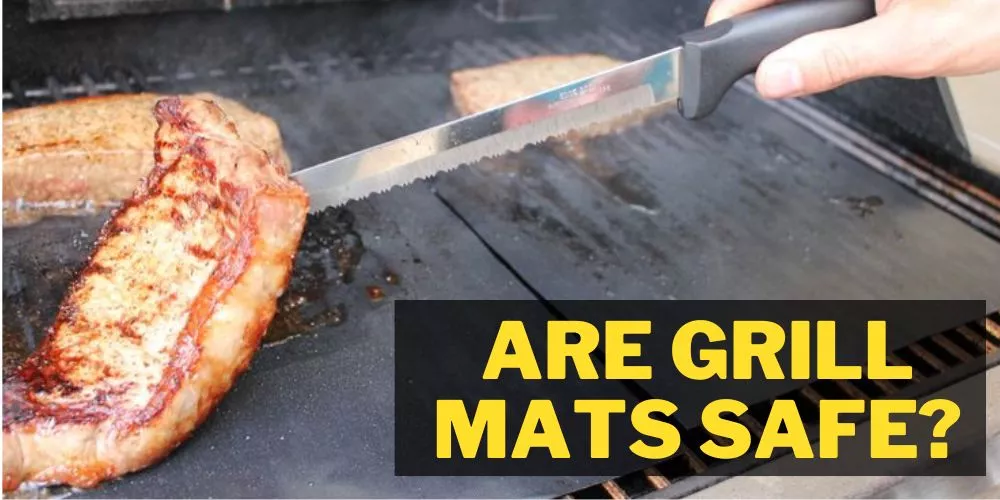In today’s health-conscious world, many of us want to make sure we’re making the best dietary choices for our well-being. This includes one of the all-time favorite dishes at backyard barbecues – BBQ ribs. But the question lingers, are BBQ ribs healthy? In this article, we will explore:
- The nutritional content of BBQ ribs
- Factors that affect the healthiness of BBQ ribs
- How to make healthier choices when enjoying BBQ ribs
- Common misconceptions about BBQ ribs and their impact on one’s diet
Join us as we delve into the surprisingly complex world of BBQ ribs and their place in a healthy lifestyle.
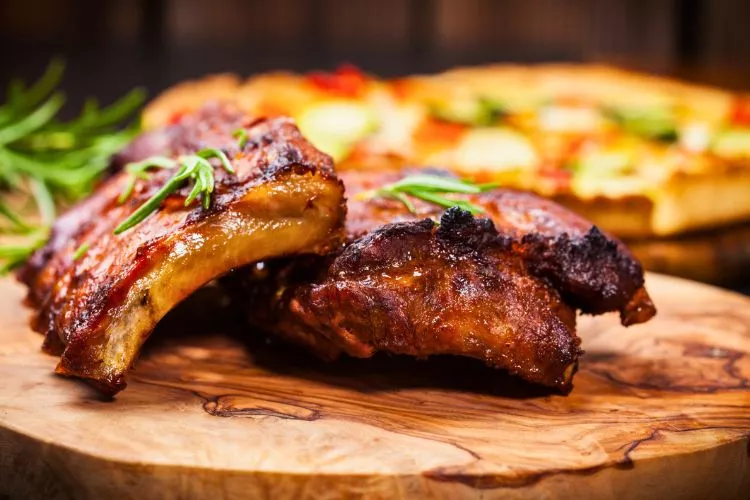
Are BBQ ribs healthy?
The answer to this question isn’t a simple ‘yes’ or ‘no’. It’s more nuanced and depends on various factors.
Usually, BBQ ribs can be a high-fat, calorie-dense food due to the cut of meat and the common preparation methods. A typical serving of BBQ ribs can contain the following:
- High amounts of saturated fats, which can contribute to high cholesterol and heart disease
- Up to 600-800 calories, depending on the portion size and recipe
- High sodium content, mainly if a lot of salt or sodium-rich sauces are used.
However, BBQ ribs also provide:
- Essential nutrients and a good source of protein
- Iron, which is integral to the production of red blood cells
- Zinc, which can strengthen the immune system
It’s essential to remember that preparation methods significantly impact the healthiness of BBQ ribs. Healthier variations can be made by:
- Using lean cuts or trimming excess fat
- Making homemade BBQ sauce with less added salt and sugar
- Grilling or smoking the ribs instead of frying
Moreover, portion control is vital. Enjoying BBQ ribs as part of a balanced meal with a generous portion of healthy sides like grilled veggies or a fresh salad can make all the difference.
In conclusion, while BBQ ribs can be high in fats and calories, they also offer nutritional benefits. Their impact on your health ultimately comes down to how you prepare them and how much you consume. They can fit into a healthy lifestyle with some careful considerations.
Carbs in BBQ Ribs with Sauce
When we think of BBQ ribs, often the first things that come to mind are their succulent taste and high protein content. But what about carbohydrates? More carbs are at play between the sauce and the ribs themselves than you might realize.
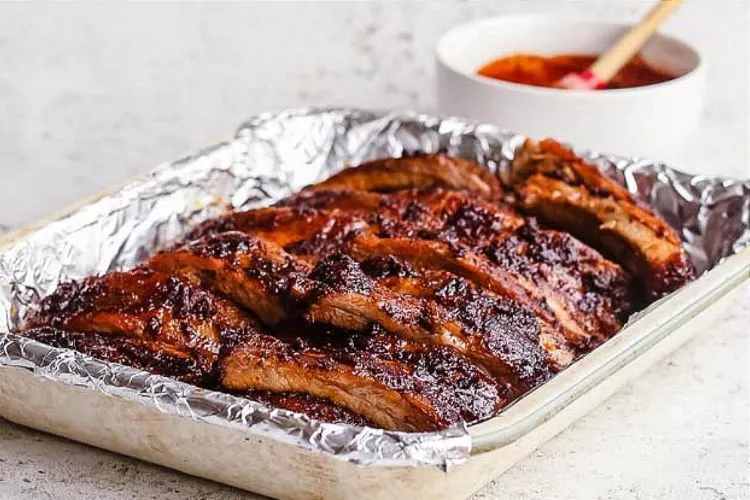
Carb Contents in BBQ Ribs
Roasted or grilled ribs themselves have minimal carbs. For example, a serving of three ounces of baby back ribs contains around 0 to 2 grams of carbs. Most of the carbs in a BBQ rib meal come from the sauce and sides or if the ribs are coated with a sugar-based spice rub.
BBQ Sauce and Carbs
The real carb contributor in this equation is often the BBQ sauce. Labelled as ‘secret ingredients’ for their distinctive sweet and tangy profiles, most commercial BBQ sauces contain high added sugars.
A single serving (two tablespoons) of BBQ sauce can contain 10 to 20 grams of carbs, primarily from sugars. Some sauces may also include molasses, honey, or brown sugar, which can increase carb content significantly.
The carbohydrate count can climb steeply when a generous amount of sauce is slathered on the ribs.
How to Reduce Carbs in BBQ Ribs?
If you’re following a low-carb diet or simply trying to minimize sugar intake, you may want to consider the following:
- Reducing the amount of sauce used
- Choosing a low-sugar or sugar-free BBQ sauce
- Making your BBQ sauce where you can control the amount of sugar added
Moderation is Key
While BBQ ribs with sauce can contain more carbs than many people realize due to the sugar in the sauce, they can still be enjoyed as part of a balanced diet. The key lies in portion size and careful selection of the sauce. As with most indulge-worthy foods, moderation is key!
Calories in Baby Back Ribs with Sauce
Baby back ribs are a popular dish, often enjoyed at barbeques and family gatherings. They are known for their tender, flavorful meat, which is enhanced further by adding various sauces. However, like many delicious foods, they are also high in calories. Let’s dive into the details:
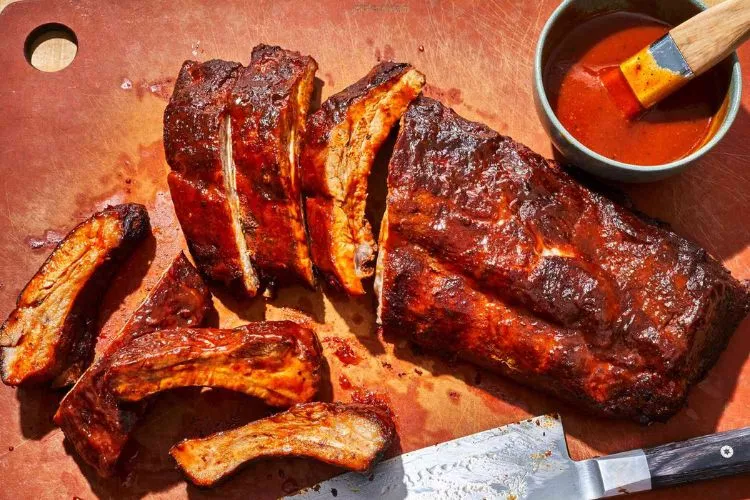
Nutritional Value
- Caloric Content: A typical serving of baby back ribs (usually around 4 ounces) can range between 250 to 350 calories.
- Sauce Impact: The number of calories can significantly increase depending on the type of sauce you use. For example, a typical barbecue sauce can add 70 to 100 calories per 2 tablespoons.
- The total caloric value of baby back ribs with sauce can thus be anywhere from 320 to 450 calories per 4-ounce serving.
What Contributes to the Caloric Content?
- Type of meat: Ribs are a fatty cut of meat, which contributes significantly to the calorie count.
- Cooking method: Grilling, smoking, marinating, and sauteing can add to the calorie content, especially if cooking oils or fats are used.
- Sauce: As mentioned earlier, the type of sauce used can significantly impact the calorie count. Creamy sauces or those high in sugar, like some barbecue sauces, are typically higher in calories.
How to Reduce the Caloric Content?
If you’re watching your calorie intake, there are a few ways you can reduce the caloric content while still enjoying your ribs:
- Trimming the fat: Removing excess fat from the ribs before cooking can significantly lower the calorie count.
- Healthy cooking methods: Opt for grilling or smoking your ribs without adding extra oils or fats.
- Homemade sauce: You can make your sauce using healthier, lower-calorie options. Using less sugar or substituting it with natural sweeteners can also help reduce calories.
Remember, while baby back ribs with sauce might be high in calories, they can still be enjoyed in moderation as part of a balanced diet.
How fattening is BBQ ribs?
Regarding BBQ ribs, it’s important to understand their nutritional values and potential impacts on your health. This infamous dish can be quite high in fats and calories; moderation is key when including them in your diet. Here’s a detailed guide to understanding how fattening BBQ ribs can be.
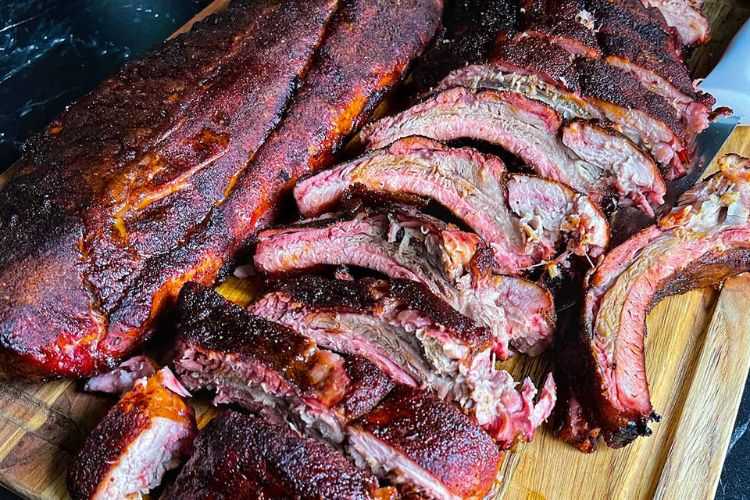
Basics of BBQ Ribs
BBW Ribs are typically made from pork, beef or chicken ribs traditionally smoked, grilled, or roasted to mouthwatering perfection. The fattening aspect of BBQ ribs primarily comes from three components:
- Type of meat: Certain types of ribs, such as pork, are inherently higher in fat.
- Cooking methods: How the ribs are prepared can also contribute to fattening.
- BBQ Sauce: Sauces, particularly BBQ ones, are often high in sugars, contributing significantly to the overall calories and fat content.
Nutritional Breakdown
For Pork Ribs
Pork ribs (specifically baby back ribs) have, on average, around 20 grams of fat and about 250 to 350 calories per 4-ounce serving, depending on the cooking method.
For Beef Ribs
The fat content in beef ribs is somewhat higher than in pork. A 3-ounce serving of beef BBQ ribs may have around 24 grams of fat and approximately 306 calories.
For Chicken Ribs
Chicken ribs are comparatively leaner; for a 3-ounce serving, chicken ribs can contain around 15 grams of fat and 218 calories.
Fattening Aspects of the BBQ Sauce
A significant proportion of the fattening aspect of BBQ ribs can be attributed to the type of sauce used. Heavy, sweet, sugary sauces increase both the calorie and sugar content. Typically, 2 tablespoons of BBQ sauce can add between 70-100 extra calories and 12-18 grams more sugar to the dish.
Cutting Back on the Fattening Aspect
You may be wondering how to enjoy this classic favorite without the guilt. Here are some tips:
- Trimming the fat: Consider trimming excess fat before cooking, which can noticeably reduce the calorie and fat content.
- Cooking methods: Smoke or grill the ribs rather than frying or sauteing in oil or butter.
- Choosing the meat: Opt for leaner cuts like chicken ribs, if possible.
- Making your sauce: Make your BBQ sauce at home with healthier ingredients and lower sugar content.
- Portion Control: Limit your serving size. Instead of making ribs the main part of your meal, use them to complement a balanced plate with lots of vegetables and whole grains.
In conclusion, the fattening aspects of BBQ ribs largely depend on the meat, cooking method, and sauce. While they are high-fat, high-calorie food, strategizing the preparation method and portion size can make them a feasible part of a balanced meal.
Which ribs are healthiest?
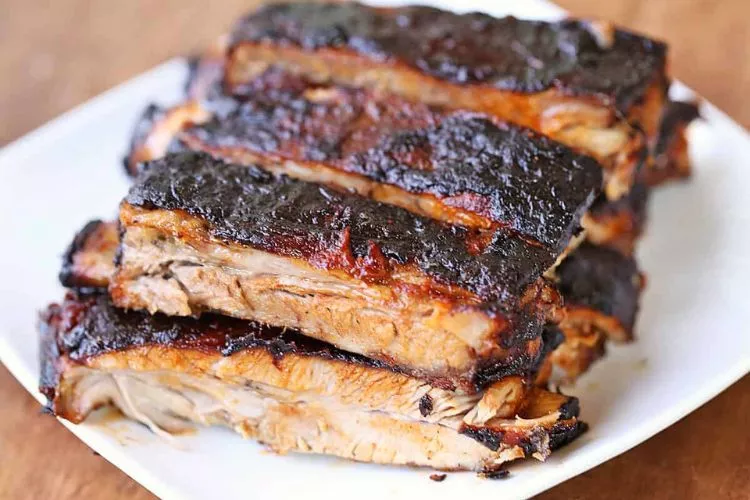
Sure, here’s a detailed grade to which ribs are the healthiest.
- Spare Ribs: Spare ribs are the leanest cut of pork ribs, making them one of the healthier options for ribs. Compared to other pork ribs, they contain less fat but are still a good source of protein, an important macronutrient needed for muscle growth and repair. In addition, spare ribs are rich in several essential B vitamins and minerals, such as zinc, phosphorus and selenium.
- Country Style Ribs: Country style ribs are another lean cut of pork that contains less fat than other styles, such as baby back or St. Louis style ribs. They are quite high in protein and also provide various essential nutrients.
- Beef Back Ribs: Regarding beef ribs, beef back ribs are a leaner cut than beef short ribs. They are high in protein, which is important for muscle growth and maintenance. Additionally, beef back ribs are rich in essential minerals like iron and zinc and provide a good amount of B vitamins.
While all ribs can be part of a balanced diet, the leanest (and healthiest) options are typically spare ribs, country-style ribs, and beef back ribs.
Do BBQ Ribs Have a Lot of Calories?
Yes, BBQ ribs do have a significant number of calories. The total caloric value of BBQ ribs varies depending on the type of meat, cooking method, and whether or not sauce is added.
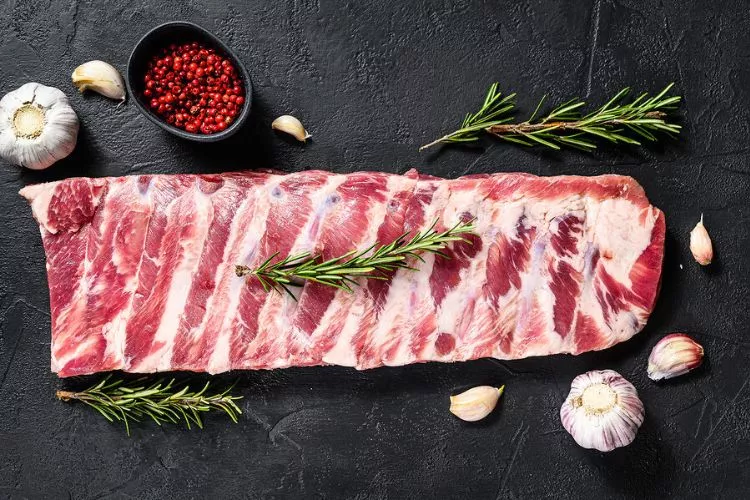
Here’s a breakdown of the approximate calorie content for different types of BBQ ribs:
- Pork Ribs: A 4-ounce serving of pork baby back ribs, when cooked using standard BBQ methods, pork baby back ribs can contain approximately 250 to 350 calories when cooked. When you add BBQ sauce, it may add 70 to 100 calories per 2-tablespoon serving.
- Beef Ribs: A 3-ounce serving of BBQ beef ribs can contain around 306 calories due to their higher fat content. The calorie count can increase when the sauce is added.
- Chicken Ribs: A 3-ounce serving of BBQ chicken ribs contains around 218 calories, which is comparatively lower than pork or beef ribs. However, the calorie content can still increase with the addition of sauce.
In conclusion, BBQ ribs have a lot of calories, and it is essential to be mindful of portion sizes and cooking methods to manage calorie intake while enjoying this delicious dish.
You may also find useful: Is Grilled Steak Healthy? | Is Electric Grilling Healthy? | Best BBQs Under 1000
frequently asked question (fAQs)
Can you eat BBQ ribs on a diet?
Answer: Yes, you can incorporate BBQ ribs into a diet, but moderation is key. Ribs are high in fats and calories, so the portion size and frequency should be controlled. Also, consider opting for leaner cuts of meat, removing excess fat before cooking, and using a low-sugar homemade BBQ sauce.
Is pork ribs healthier than beef?
Answer: Pork ribs and beef ribs each have their nutritional distinctions. Pork ribs are typically lower in calories and fats compared to beef ribs. However, both provide a good source of protein and essential minerals. It often comes down to the cooking method, portion size, and personal dietary needs to determine a healthier choice.
Is pork healthy for weight loss?
Answer: Pork can be part of a healthy weight loss diet when consumed in moderation and cooked healthily. Lean cuts of pork like loin or tenderloin are lower in fats and calories while high in protein, which can aid in weight loss. But it’s important to remember that portion control is crucial.
Is BBQ good for your heart?
Answer: This heavily depends on the type of BBQ. Lean meats, fruits, and vegetables cooked on the grill can be heart-healthy. However, red and processed meats often used in BBQs, such as ribs or sausages, can be high in saturated fats and sodium, which may increase heart disease risk when consumed in excess. Prefer grilling over lower temperatures and marinate your meats to reduce potentially harmful compounds that form during high-heat cooking.
Conclusion:
In conclusion, if you are wondering are BBQ ribs healthy, well it depends on individual factors, cooking methods, portion control, and the type of ribs chosen. While they can be high in fats and calories, opting for leaner cuts of meat, utilizing healthier cooking techniques, and consuming BBQ ribs in moderation can make them a part of a balanced and nutritious diet.
It is essential to be mindful of the potential health risks associated with excessive consumption of fatty meats and opt for more heart-healthy choices whenever possible. With the right approach, BBQ ribs can be savored responsibly while focusing on overall health and well-being.


